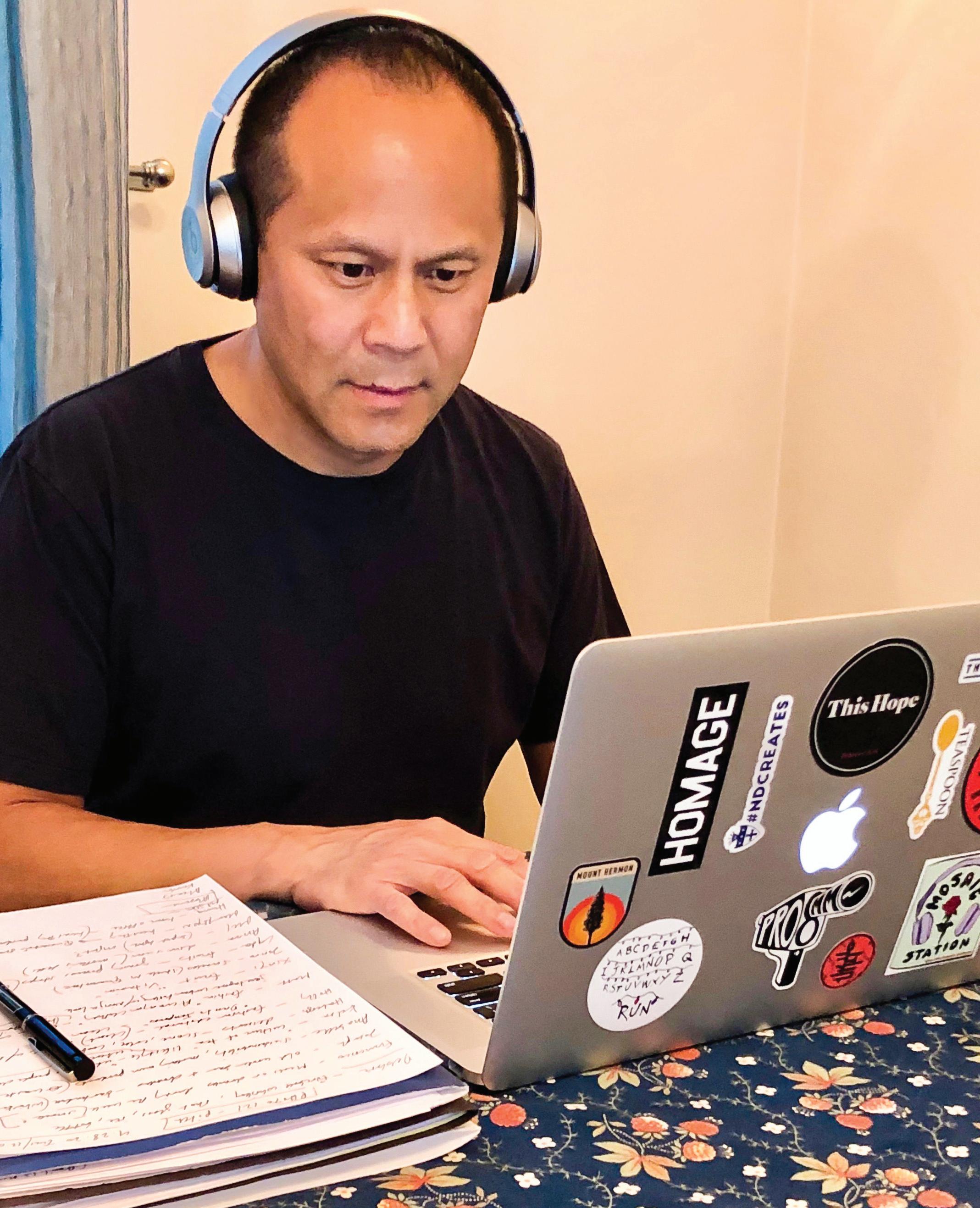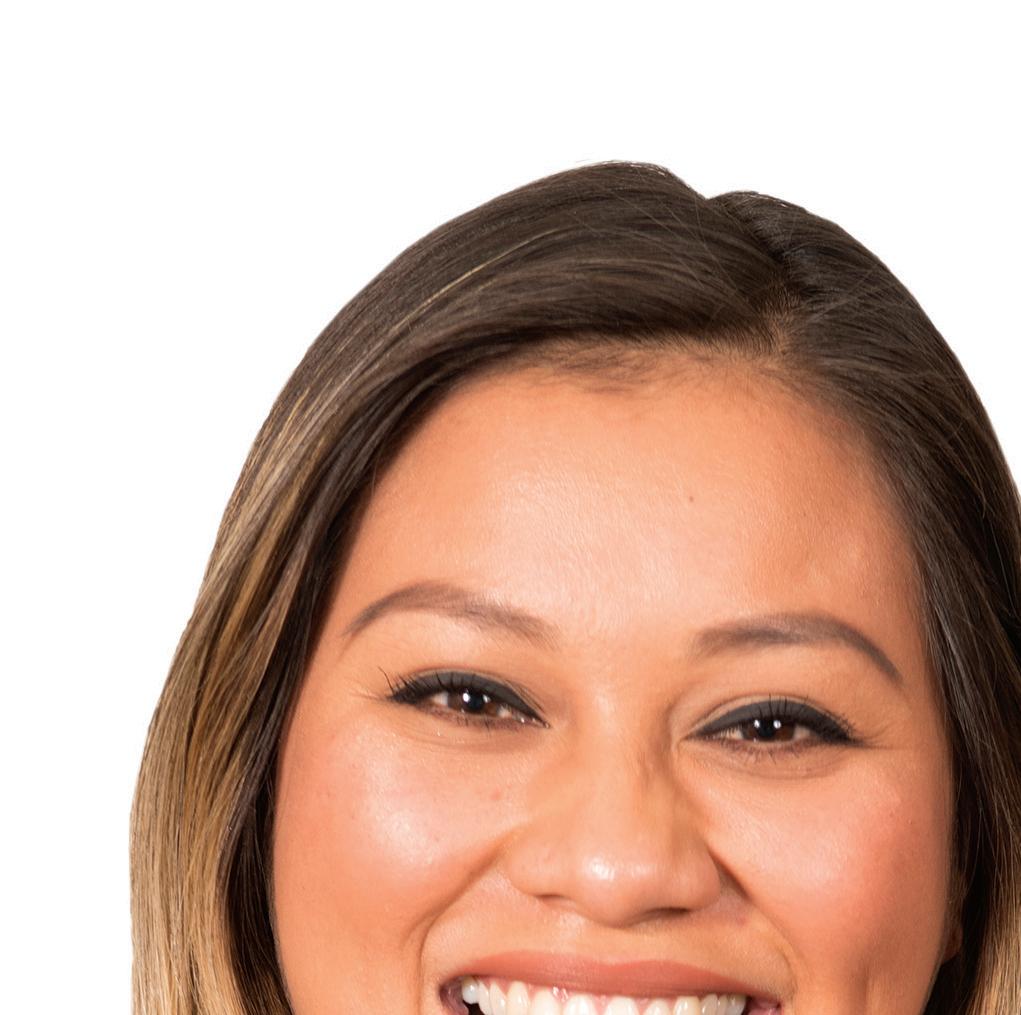
30 minute read
Audit finds donor funds misused
Tuesday, May 5, 2020 Volume 154
SERVING SAN JOSE STATE UNIVERSITY SINCE 1934 (SJSUNEWS.COM/SPARTAN_DAILY)
Advertisement
By Kunal Mehta
SCIENCE & TECH EDITOR
An audit conducted by the California State University found that San Jose State Athletics did not always honor donors’ intentions on where the money should be used when processing donations.
SJSU requested the audit following the Spartan Daily’s reporting in “Millions Misused: SJSU allegedly mishandled $6.3 million per documents.” Based on sources and confirmed by documents, in May 2019 the Daily reported that less than 5% of Spartan Foundation money intended for athletic scholarships was distributed to SJSU athletes from 2013-2016.
The Spartan Foundation was an independent fund for SJSU athletics that primarily raised money for studentathlete scholarships until it changed its bylaws in 2012 to broaden its scope.
Out of the 178 donation instances reviewed, auditors “found that [SJSU] Athletics designated the donations to accounts that did not match donors’ intent for 29 donations totaling $83,341.”
“I thank the audit team for their thorough investigation,” SJSU President Mary Papazian stated in an email to the Daily. “Based on the audit report, the 29 donations where donor intent was not met totaled $83,341 – and when added with the instances when intent could not be identified – was a stark contrast from the more than $6.3 million that was alleged. I am already taking steps to fulfill my promise to use other resources to honor donor intent or return the gift.”
Auditors found that funds designated for student-athlete scholarships ended up in accounts allocated for different purposes.
The President’s Cup golf tournaments in 2013-14 and 2014-15, advertised that proceeds would go toward studentathlete scholarships, but donations were instead deposited into the “Athletics special events account,” according to the audit.
The majority of the money in the
AUDIT| Page 2
IN BRIEF
SJSU requested an audit following Spartan Daily’s “Millions Misused” report in May 2019.
CSU audit found that SJSU Athletics did not always honor donors’ intentions when processing where donations went.
The university expects to implement auditors’ recommendations by Sept. 30, noting that COVID-19 may cause delays.
Students urge CSU relief amid pandemic
COURTESY OF JONATHAN FUNG Ayla Fung, a tenth grader, works on her computer to complete a homework assignment for her online class.
Professors adjust to parenting and Zoom
By Briana Conte
STAFF WRITER
PARENTS | Page 2
Prior to California’s shelterin-place, some San Jose State professors already had experience with online teaching. Now working from home, they are witnessing their own children undergo inefficient onlinelearning strategies.
“As an adult who has experience teaching, even I have trouble sitting in a 45-minute Zoom meeting with colleagues,” said Rosanna Alvarez, Chicana and Chicano studies professor, in a phone interview with the Spartan Daily. “I can’t imagine what in the heck this is like for my kids.”
The California Department of Education put out a remotelearning guidance statement recognizing that there are benefits to online learning such as time shifting, pace shifting and personalization. However, it stated that online courses can also compromise student engagement because of the lack of in-person interactions.
Alvarez is a mother of three: an eighth grader, a fifth grader and a second grader. She said that her children have four-hour online school days but they all have different schedules.
She said her second grader’s class time at home is consistent and the teacher insists on students sitting through the entire teleconference call, similar to an in-person class.
However, Alvarez’s kids still need her help every day.
“If they were in class with [the teacher], I wouldn’t be there,” Alvarez said. “So fingers crossed [my daughter] doesn’t need me, but nine times out of 10 she comes in like ‘Mommy, I need help.’ ”
Alvarez said this experience with her daughters and her own experience teaching online classes showed her that the best way to go about teaching remotely is by offering more one-on-one time with students.
“I’m looking at all three [kids] and I feel like the [teacher] who requires less direct time with them for such prolonged periods is the most effective one,” Alvarez said. “The time that they do have, they’re super focused and then they get [their work] done.”
Before the shelter-in-place order, Alvarez said she would set up a biweekly module in her online Chicana and Chicano studies class and offered one-on-one meetings with her students.
“A lot of times, students sign up for an online class because they need flexibility,” Alvarez said. “They have access to me all the time. I have set office hours and I try to do online cafecitos.”
Art and photography lecturer Jonathan Fung said he recognized that his daughter, a tenth grader, is also struggling to adjust to online school.
“She has more homework than before,” Fung said. “Sometimes she is working for four to six As an adult who has experience teaching, even I have trouble sitting in a 45-minute Zoom meeting with colleagues. I can’t imagine what in the heck this is like for my kids. Rosanna Alvarez Chicana and Chicano studies professor
CSU Students for Quality Education advocates criticized the California State University system for its handling of the coronavirus pandemic and provided a list of demands in a Friday news conference hosted on Zoom.
“We are here today to bring awareness to a large group of people who have fallen into a gray area during this COVID-19 pandemic; college students,” said Hayli Antoniewicz, a Students for Quality Education representative from California State University, Long Beach.
The student movement was formed in 2007 after the Great Recession to deal with students’ issues in the aftermath of an economic crisis.
The California Faculty Association participated in the Zoom call discussion in solidarity with the student representatives.
“We have made an intentional and conscious decision to organize and form an anti-racist and social justice unionism frame,” said Margarita Berta-Avila, University of California, Sacramento California Faculty Association chapter president from California St ate University, Sacramento. “Which means we are organizing to ensure that the CSU is not only a vantage point for our faculty, but our students and their future.”
After discussing the perceived problems students are facing during the pandemic, advocates voiced solutions to address refunding student fees, eliminating student debt, paying CSU employees and providing free housing.
“The CSU system’s students need far more sustainable support from the system as a whole and their individual campuses in the wake of campus closure and the transition to online courses,” said Mei Curry, a California St ate University, Stanislaus Students for Quality Education representative.
The representatives demanded the CSU system fully reimburse school fees and services that were suspended because of COVID-19. Additionally, they said the CSU campuses should create an emergency stipend for recently unemployed student workers and another for students currently enrolled. Faculty members and staff should also receive the same pay now as they would have during in-person instruction, said the student representatives.
The student movement also called for the full cancellation of student debt and a wealth tax to pay for these measures.
By Andrew Glenn
STAFF WRITER DEMANDS | Page 2 The CSU system’s students need far more sustainable support from the system as a whole and their individual campuses in the wake of campus closure and the transition to online courses. Mei Curry CSU Stanislaus Students for Quality Education representative
special events account went into a general fund controlled by the athletic director who could determine how the money was spent. But auditors “concluded that the proceeds should have been deposited in the scholarship account.”
“I care deeply about ensuring our donors can trust SJSU Athletics to appropriately steward their generous gifts that benefit our outstanding student-athletes,” Athletics Director Marie Tuite stated in an email to the Daily. “Because of this, I made it a point of emphasis early in my tenure to rebrand our marketing materials to provide clearer language to donors regarding how their donations might be used.”
In a response to the Spartan Daily’s reporting last year, SJSU wrote in a June 2019 statement, “Every donation designated by the donor for athletics scholarship was used for that purpose.”
Auditors said they could not determine the intent in 46 other donation instances totaling $288,577 because SJSU Athletics didn’t obtain the proper documentation.
According to the audit, former Athletics Director Gene Bleymaier instituted a policy in which coaches would raise money for their sport. At least a portion of that money was then transferred into a general fundraising account for the Athletics Department.
Auditors wrote that the policy “did not honor donor intent.” Tuite ended the policy in 2017.
The audit found that “in general, student-athletes received the athletic scholarships they were promised” by examining scholarships received by 10% of athletes from 2017-18 and 2018-19.
Some athletes told the Spartan Daily in 2019 that their scholarships had been canceled, an allegation auditors investigated too.
After reviewing 12 out of the 53 scholarships that were canceled between 2016-17 and 2018-19, auditors found that all the coaches followed policy and no scholarships were revoked without cause. Each of the athletes was provided the appropriate opportunity to appeal the decision.
CSU auditors described everyone they contacted as “very cooperative,” Michael Uhlenkamp, CSU senior director of public affairs, said in an email. He declined to answer some specific questions from the Spartan Daily, explaining, “We will not further expound on the information from the report or respond to questions related to the methodology beyond what is outlined in the report.”
The report concluded with eight AUDIT Continued from page 1 I care deeply about ensuring our donors can trust SJSU Athletics to appropriately steward their generous gifts that benefi t our outstanding student-athletes. Marie Tuite SJSU Athletics Director TUITE BLEYMAIER
different recommendations for SJSU to implement. The university agreed with every single one and anticipates to have them all instituted by Sept. 30 but noted that the COVID-19 pandemic may affect the timeline.
“We will continue to work with campus leadership to address the recommendations made in the audit report,” Tuite stated.
It is now on SJSU to implement the audit’s recommendations. “Campuses are responsible for following up and submitting supporting documents prior to any suggested completion dates,” Uhlenkamp said.
“I am committed to instituting the audit’s recommendations by September 30, notwithstanding any delays caused by COVID-19,” Papazian stated.
Follow Kunal on Twitter @legoktm@mastodon.technology
An earlier version of this story was published online.
PARENTS Continued from page 1
hours a day in her room.”
He said his daughter told him that the weekly accumulation of work was the hardest adjustment from in-person classes to online classes.
“She has seven classes and she meets with her teachers through Zoom,” Fung said. “Most of them are once a week. Some might be a little bit more, but that is either to go over the material they are lecturing or redeeming what homework was due.”
As a result, Fung said his daughter’s workload is “kind of like college” and that she’s developing time management skills by trying to get her work done ahead of time for the following week.
Fung said this online transition didn’t just prepare his daughter for college, but it also improved his own class and how he connects with his students.
“Zoom has been a good change because when I walk into the lecture hall there’s so many students, so it’s hard to get to know them all,” Fung said. “Now that I can actually see their faces and their name on screen and have a conversation, being shifted online actually might help me engage students more one on one.”
Political science professor James Brent said that he prefers in-person classes – not just for his SJSU students, but also for his 11-year-old twins.
“It actually becomes hard,” Brent said. “It is difficult to make them remember that this is not a vacation.”
Brent said that both his children and SJSU students are not benefiting from online courses.
“There is something about being in a physical place that I think is really important,” Brent said.
He said some types of classes, such as political science, thrive on immersive discussions and valuable in-person dialogues, which are not easily achievable through wireless networking.
Brent said he doesn’t have the opportunity to go into the amount of detail he would normally.
“As I’m recording these lectures [I understand that] this is just the stripped down version,” Brent said. “The interaction with the students is just absolutely crucial.”
Rosanna Alvarez said that even though this transition is rough for teachers, parents and students alike, being more compassionate and adjusting expectations will help everyone.
“I think a lot of [professors] are either clinging to that sense of normalcy and forcing people to power through [this pandemic],” Alvarez said. “I worry that that might disengage some students in the bigger scheme of things.”
Follow Spartan Daily on Twitter @SpartanDaily

COURTESY OF JONATHAN FUNG Jonthan Fung, an SJSU art and photography lecturer, prepares to teach his online courses, which he says has helped him to connect better with his students.
To address resource instability, representatives also demanded that the CSU campuses provide safe, free and universal guaranteed housing for students during the pandemic and enforce a full rent, mortgage and utility freeze.
The student movement also called for the formation of a paid student oversight task force, named by their organization, to maximize transparency in the CSU’s use of the coronavirus relief bill funds.
They also demanded that all 23 CSU campuses provide a solidified date for an in-person commencement ceremony for the graduating class of Spring 2020.
Finally, the organization’s re pre s e nt at i v e s s a i d emergencies such as the pandemic show the need for more student input in the CSU system’s operations.
“These demands recognize that our students, faculty and staff are people first and with that, their basic human needs can no longer go unrecognized in the CSU system,” said Tamiel Mckee Bey, a San Diego State University Students for Quality Education representative.
Alejandro Bupara, a student representative for California Polytechnic State University at San Luis Obispo, said that the demands were made with the interests of the impacted community in mind. , said that the demands were made with the interests of the impacted community in mind.
“Our dream for the future is simple; a society in which CSU students, faculty and staff are safe, loved and well provided for at all levels of our lives,” Alejandro Bupara said. “We hope [others] will share in the dream with us.” DEMANDS Continued from page 1 Follow Andrew on Twitter @SaviorElite10 Crime Blotter Vandalism: property damage April 21, 12:45 a.m. at Dr. Martin Luther King Jr. Library Information only Possess/carry/transfer switchblade knife April 23, 12:24 a.m. at Event Center Adult cited Arson: inhabited Structure April 24, 8:06 p.m. at University Police Department Adult arrest Trespassing: occupying property without consent April 25, 1:28 a.m. at Interdisciplinary Science Building Adult cited Trespassing: occupying property without consent April 25, 5:04 p.m. at Interdisciplinary Science Building Information only Battery on a peace offi cer April 26, 12:06 a.m. at Chi Pi Sigma Fraternity Adult cited Trespassing: occupying property without consent April 26, 6:23 p.m. at Associated Students Scheller House Adult arrest Trespassing: occupying property without consent April 27, 10:28 a.m. at Campus Village A Adult cited Make Fictitious Check April 27, 10:40 a.m. at Kappa Sigma Fraternity No disposition Corporal injury to spouse/false imprisonment with violence stalking May 1, 9:11 a.m. at Campus Village A No disposition Vandalism over $400 Felony May 1, 9:11 p.m. at Engineering Building Information only Theft Of Utility Service May 5, 10:55 p.m. at Art Building Adult cited Our dream for the future is simple; a society in which CSU students, faculty and staff are safe, loved and well provided for at all levels of our lives.
Alejandro Bupara Student representative
Andy Shauf • rock • Jan. 24
Canadian singersongwriter Andy Shauf ’s “Th e Neon Skyline” is the year’s best indie record so far and one of the best concept albums ever made.
Adding up to a little more than half an hour, the 11 songs on his fourth LP tell a heartbreaking, down-toearth story about meeting up with old friends and an exlover at a bar. He details each witty joke and confessional line between the characters during a night of drinking and emotional catharsis.

Building on the intense narrative focus of Shauf ’s 2016 album, “Th e Party,” his lyrics read like a mix between a John Steinbeck short story and an Aaron Sorkin screenplay, throwing conventional rhyme schemes away in favor of painterly details and grounded conversations.
Although Shauf ’s musical ability is impressive, evident in his craft ing of folksy ballads by playing every single instrument himself, the storytelling and bleeding heart of this album are what will keep you coming back for more.
If you need a soothing voice and some stunning tunes to help you through a bad break up or tough times in general, “Th e Neon Skyline” might be one of your new favorites.
King Krule • rock • Feb. 21
punk and jazz even more emotional weight and power.
Archy Ivan Marshall’s music has always been dark, but none of his past albums have delivered powerful moods through songs as catchy as the ones on “Man Alive!”
From the fi ery saxophone over the driving bass and

drums on “Comet Face” to the warm guitars on the spacey ballad “Energy Fleets,” each track adds to the album’s unique aesthetic with vulnerable vocals, earworm melodies and sullen soundscapes.
If you need something to let you know that you’re not insane and the world really is as horrible as it seems, “Man Alive!” might help you process the darkness we’re all facing right now.
R.A.P. Ferreira • rap • March 6
No album exposes the common ground shared between hip-hop and poetry quite like “Purple Moonlight Pages.”
Wisconsin-native R.A.P. Ferreira craft ed a jazz-hop album just as chill as it is smart, with the help of some fantastic beats from his backing band, Th e Jeff erson Park Boys.
Delivering a refreshing change of pace from the lofi production on Ferreira’s previous albums, Th e Jeff erson Park Boys fi ll

“Purple Moonlight Pages” with lively performances and dynamic shift s that perfectly suit Ferreira’s unpredictable fl ows.
Although his lyrics don’t come together to form any grand concept, Ferreira packs two or three albums’ worth of witty punchlines and philosophical gems into the album.
His performances are unrelentingly charismatic, whether he’s describing a peaceful domestic scene over the jazzy pianos and warm bass of “LAUNDRY” or melodically bragging about his artistic trajectory over the soulful horns and propulsive drums of “LEAVING HELL.”
If you’re looking for some dense, conscious hip-hop that eff ortlessly blends classic boom-bap and contemporary jazz, don’t miss “Purple Moonlight Pages.”
Smino • rap • April 20
Smino remixes a few other rappers’ songs, including Megan Th ee Stalion’s “Savage” and Roddy Ricch’s “Th e Box,” but his unique performances make these cuts equally as great or even better than the originals.
Th e mixtape features plenty of original material as well, including Smino’s surprisingly

personal performance over the Th undercat-co-produced luxurious boom-bap of “Year of Th e Goat.”
Th e carefree remix of Smino’s 2018 song “KLINK,” featuring a new beat and a hilariously energetic guest appearance from T-Pain, wraps up the album in gloriously indulgent fashion.
Smino delivers bangers that don’t take themselves too seriously, making “She Already Decided” feel like an early 2010s DatPiff mixtape in the best way possible.
Squarepusher • electronic • Jan. 31
Sometimes there’s nothing wrong with going back to basics.
On “Be Up A Hello,” Squarepusher returns to the drum and bass he helped pioneer in the late ’90s, updating it with lush production and adventurous composition.
After several years and albums of odd experiments with varied genres, English producer Tom Jenkinson revived the sounds of classic electronic music with one of his most versatile and
exciting projects yet.
From lightning-fast bass arpeggios over break beats on “Nervelevers” to neo-baroque synthpop on the opening track “Oberlove,” Squarepusher attacks strange aesthetics with glitching synths, driving beats and otherworldly textures.

Even “Be Up A Hello’s” slower moments stand out as some of the album’s highlights, with the atmospheric drama of “Detroit People Mover” and the haunting ambience of the closing track “80 Ondula” providing much needed breathing room to help digest the album’s chaos.
More than 20 years into his musical career, Squarepusher is still pushing the genre forward with some of his most inventive and entertaining songs yet.
Against All Logic • electronic • Feb. 7
What began as a veteran producer’s side project has quickly become one of the most exciting acts in electronic music.
On “2017-2019,” Against All Logic pushes the boundaries of house music, blending it with reimagined elements of IDM, ambient and even industrial hip-hop.
Th e 2018 album “2012- 2017,” which introduced Chilean-American composer Nicolas Jaar’s Against All Logic stage name, provided a refreshing change of pace from his usually ambient and

abstract material, craft ing forward-thinking fusions of distorted electronics and chopped soul samples.
Instead of revisiting this brand of nostalgicyet-futuristic house, Jaar completely reinvents the project’s aesthetic on “2017- 2019,” creating strange and harsh soundscapes that reveal more depth with every listen.
From the wall of Beyoncé samples on opening track “Fantasy,” to the pulsing bass and crushing cymbals of “Deeeeeeefers,” each track transforms familiar sounds into something inventive, nuanced and almost unrecognizable.
If you’re looking for tunes that get you moving before they beat you senseless with aggressive samples and grimy bass, don’t miss Against All Logic’s latest achievement.
Zack Villere • pop • Feb. 14
If you need some cozy tunes to ease the loneliness of quarantine, nothing is more comforting than Zack Villere’s “Cardboard City.”
Th is oddball singer, songwriter and producer’s sophomore album builds on the homespun aesthetic and endearing vocals of his 2017 debut, “Little World,” fi lling “Cardboard City” with even more vulnerable performances and theatrical instrumentation.
Although he pulls from a variety of infl uences, oft en blending R&B, pop, hip
hop and electronic music, Villere’s restraint keeps his songs from feeling messy or overwhelming.
Avoiding abrupt shift s in tone and sound, Villere develops songs through patient, dynamic evolutions, giving his heartwarming lyrics and vocals space to breathe while changing up

the backdrop enough to keep his songs engaging.
H e a r t - s t o p p i n g l y gorgeous touches like the gritty guitar solo over the soft keys of “Sore Th roat” or the snappy hip-hop beats and playful piano arpeggios on “Knockout” make “Cardboard City” endlessly replayable.
If you want to hear some cute songs with a unique aesthetic, don’t miss the best work yet from one of indie-pop’s brightest stars.
Rina Sawayama • pop • April 17
Even as pop music becomes more experimental, Rina Sawayama manages to stand head and shoulders above her competition on her fi rst studio album, “SAWAYAMA.”
Aft er releasing her debut EP in 2017, Sawayama quickly established herself as one of pop’s most-exciting voices, combining the indulgent aesthetic of 2000s stars with the adventurous sound of modern icons like Charli XCX.
Sawayama fi lled her debut with enough meaningful and

catchy tracks to rise even higher than those infl uences.
Intricate production from EDM producer Clarence Clarity packs even “SAWAYAMA’s” most anthemic and accessible songs with rewarding details, like the jarring transitions between clean pop goodness and heavy metal riff s on “XS.” “Sawayama quickly established herself as one of pop’s mostexciting voices . . .”
Sawayama’s ability to belt out sing-along choruses doesn’t stop her from getting heartfelt near the album’s climax, like on the tribute to lost friendships “Bad Friend” or “Chosen Family,” a synth-heavy ode to fi nding common ground despite diff erent backgrounds.
“SAWAYAMA” has enough creative production and heartfelt songwriting to please music fans of all kinds. Do yourself a favor and reserve your spot to watch Rina Sawayama’s meteoric rise to pop stardom.
Paul Hang SENIOR STAFF WRITER

Competitive gaming can bring players together, but toxic gamers can ruin it for everybody.
Just like playing any sport, it feels amazing to win tough competitions. Sharing that pride with a team member or someone who supports you just enhances that feeling.
However, the people who take credit for their teams’ wins may have a hard time believing they were responsible for losing a match. Th ey may blame others for their defeats.
A classic tactic to bring down an opponent’s morale is to trash talk.
According to the 2017 article “How To Trash Talk” on gaming website Kotaku, writer Cecilia D’Anastasio described trash talking as a tactic to about your skill level and making fun of your opponent’s playing ability.
Trash talking isn’t for everyone, but there are gamers who see the appeal of participating in it.
But what is the fi ne line between trash talking and being toxic? Both may seem similar, but they’re not.
Trash talking shouldn’t be looked at as something harmful, but as a fun, silly way to get in your opponents’ heads.
As long as the content doesn’t get too personal, such as mentioning gender, race, or private information – it’s fair play.
However, ad hominem attacks can happen and this is where things can go from something silly and fun to vulgar and harmful.
boost one’s self-confi dence in a match.
D’Anastasio said some examples are boasting
No gamer wants to play an online game and be stuck with a sore loser.
Sometimes that particular sore loser can be racist or homophobic, which only makes matters worse because gaming is supposed to be fun and a way to escape real-world troubles.
Online harassment and vulgar behavior can aff ect players’ enjoyment of the game.
In team-driven video games, you generally want to have good chemistry with your teammates so your performance isn’t hindered.
However, since gamers can remain anonymous with usernames, they feel safe behaving in a toxic way toward others.
Game developers have implemented systems to prevent these problems while gaming online
ILLUSTRATION BY NATHAN DOYLE

because of these situations.
Video game developer Ubisoft has implemented an automated chat fi ltering program that will ban players for using toxic language in the text chat of the video game “Tom Clancy’s Rainbow Six Siege.”
Problematic players receive temporary bans lasting ranging from 27 minutes to 2 hours, depending on if the player is a repeat off ender. Aft er the third instance of toxic behavior, an investigation of the player happens, which could potentially lead to a permanent ban.
In a 2018 article on technology-based website TechCrunch, writer Jordan Crook said online gaming has grown into

a toxic environment due to the lack of policy and punishment of unpleasant behavior.
Th ese bans are widely lauded and it’s something more developers should implement if they notice the player base is riddled with toxic people.
Online gaming should be enjoyable for everyone. Nobody should feel bullied or demoralized while playing a video game.
In a 2018 esport article on Hybrid, writer Ayyub Mustofa said players make a choice to be toxic.
Mustofa said online gaming is a competitive environment which can lead some people to say horrible things when they feel that the game is all that matters.
Th ere are some players that are truly competitive and always have that desire to win, but they need to realize that not everyone is as competitive as they are.
Being competitive doesn’t necessarily mean you have to have bad mouth other players to display your competitive spirit.
Toxic behavior just makes you look childish and brings down your own teammates.
Toxicity doesn’t make you a great player or teammate – it makes you someone to avoid.
Follow Spartan Daily on Twitter @SpartanDaily
Earn your bachelor’s degree faster and save money. Take summer classes with us, and transfer the units.










Invest in


Register at www.chabotcollege.edu
Austin Turner SENIOR STAFF WRITER
Congratulations to the NCAA and welcome to the 21st Century.
After more than 100 years of exploiting the talents of young men and women, the NCAA Board of Governors announced Wednesday its support in allowing studentathletes to be paid for endorsements deals, which would be implemented by January 2021.
The rules will prohibit schools from paying their players and specifies that student-athletes will be allowed to receive money only from outside businesses.
Was this news an attempt for the NCAA brand to save face after multiple top men’s basketball recruits chose to skip college in favor of $125,000 contracts with the NBA’s G League? Most likely.
But no matter the reason, it’s about time.
According to ESPN, the NCAA topped $1 billion in revenue for the first time in the 2016-17 academic year. Excluding scholarships, student-athletes received none of that money.
In recent years, the debate about paying college athletes has gained momentum in the sports world. It eventually turned from whether they should be paid, which was a resounding yes, to how they should be paid.
It doesn’t take an economics degree to understand why all NCAA athletes shouldn’t just be given a salary. It’s simple: small sports programs, such as golf, don’t rake in the same amount of money as football.
That’s why the NCAA’s conclusion makes sense. Let the market dictate disbursement.
And the market is about to significantly alter the on-field product.
College sports are regional. Travel to a college town in rural America and almost everyone within city limits is repping the local school.
The businesses in those towns are going to sponsor student-athletes. It might not be much, but they’ll pay.
Numerous five-star high school basketball recruits already choose to skip school for smaller professional leagues in other countries, which shows that having a source of income is still the most important thing to student-athletes and their families.
It’s just another angle
ERNIE GONZALEZ | THE SPEAR ARCHIVES The NCAA announced Wednesday that it will allow student-athletes to take endorsements from outside businesses. This includes athletes like those on the Spartans women’s beach volleyball team, as pictured above.

coaches get to pitch while recruiting – “X business by campus has a history of paying our quarterbacks Y dollars. Want to be our new quarterback?”
Now, wealthy markets with few professional sports teams will prosper. Schools such as Boise State University and Brigham Young University will be big beneficiaries of these new rules. College towns are crazy about their programs because they don’t have a professional team to support.
It’s schools like San Jose State that are stuck in a gray area. The Bay Area is already saturated with professional teams in all five major sports leagues and the Spartans don’t exactly have a huge fanbase.
Outside of football, baseball and basketball, the effects will be minimal. Unless you’re an Olympic gold medalist like former-Stanford University swimmer Katie Ledecky, you’re probably not cashing in on endorsements.
It’s OK if not everybody is making money. The positive thing is that the NCAA is no longer taking money out of the hands of its student-athletes, or should I say, employees.
Follow Austin on Twitter @AustinTurner_
stay connected
FACEBOOK: spartandaily INSTAGRAM: @spartandaily
TWITTER: @spartandaily YOUTUBE: spartandailyYT
Have a story idea? Contact us at spartandaily@gmail.com.
– send a letter to the editor –
Letters to the Editor may be placed in the letters to the editor box in the Spartan Daily office in Dwight Bentel Hall, Room 209 or emailed to spartandaily@gmail.com to the attention of the Spartan Daily Opinion Editor. Letters to the Editor must contain the author’s name, year and major. Letters become property of the Spartan Daily and may be edited for clarity, grammar, libel and length. Only letters of 300 words or less will be considered for publication. Published opinions and advertisements do not necessarily reflect the views of the Spartan Daily, the School of Journalism and Mass Communication or SJSU. The Spartan Daily is a public forum.
ABOUT The Spartan Daily serves as San Jose State’s top news source and was named the best student newspaper in the state. New issues are published Tuesday through Thursday during the academic year with the website updated daily.
The Spartan Daily is written and published by San Jose State students as an expression of their First Amendment rights.
Reader feedback may be submitted as letters to the editor or online comments.
EDITORIAL STAFF EXECUTIVE EDITOR CHELSEA NGUYEN FLEIGE
MANAGING EDITOR BRENDAN CROSS
EXECUTIVE PRODUCER JOHN BRICKER
CREATIVE PRODUCER MELODY DEL RIO
NEWS EDITOR CHRISTIAN TRUJANO
ASST. NEWS EDITOR MAURICIO LA PLANTE
PRODUCTION EDITOR MARCI SUELA
PHOTO EDITOR JOHANNA MARTIN
SPECIAL PROJECTS EDITOR VICENTE VERA
SCIENCE & TECH EDITOR KUNAL MEHTA
SOCIAL MEDIA EDITOR JAILEANE AGUILAR
CONTENT EDITOR VICTORIA FRANCO
COPY EDITORS OLIVIA BOWMAN ERICA LIZARRAGO COURTNEY VASQUEZ
SPANISH COPY EDITOR DIANA AVILA
GRAPHICS EDITORS CINDY CUELLAR NATHAN DOYLE
SENIOR STAFF WRITERS DIANA AVILA KELLEN CONCENTINE PAUL HANG BRIANNA SHEATS EDUARDO TEIXEIRA AUSTIN TURNER
STAFF WRITERS JOCLYN AGUIRRE BRYANNA BARTLETT BRIANA CONTE ANDREW GLENN SHRUTHI LAKSHMANAN DAN NGUYEN CHRIS PADILLA GIA PHAM BRIAN SO
STAFF PHOTOGRAPHER BLUE NGUYEN
PRODUCTION CHIEF MIKE CORPOS
NEWS ADVISER RICHARD CRAIG
ADVERTISING STAFF ADVERTISING DIRECTOR MARCI SUELA JESUS TRUJILLO ARMANI WARD
ADVERTISING ADVISER TIM HENDRICK
BUSINESS MANAGER CINDY LUU
CONTACT US
EDITORIAL –
MAIN TELEPHONE: (408) 924-3281
EMAIL: spartandaily@gmail.com
ADVERTISING –
TELEPHONE: (408) 924-3270
EMAIL: spartandailyadvertising @gmail.com
CORRECTIONS POLICY The Spartan Daily corrects all signifi cant errors that are brought to our attention. If you suspect we have made such an error, please send an email to spartandaily@gmail.com.
EDITORIAL POLICY Columns are the opinion of individual writers and not that of the Spartan Daily. Editorials refl ect the majority opinion of the Editorial Board, which is made up of student editors.
Audit finds donor funds misused

